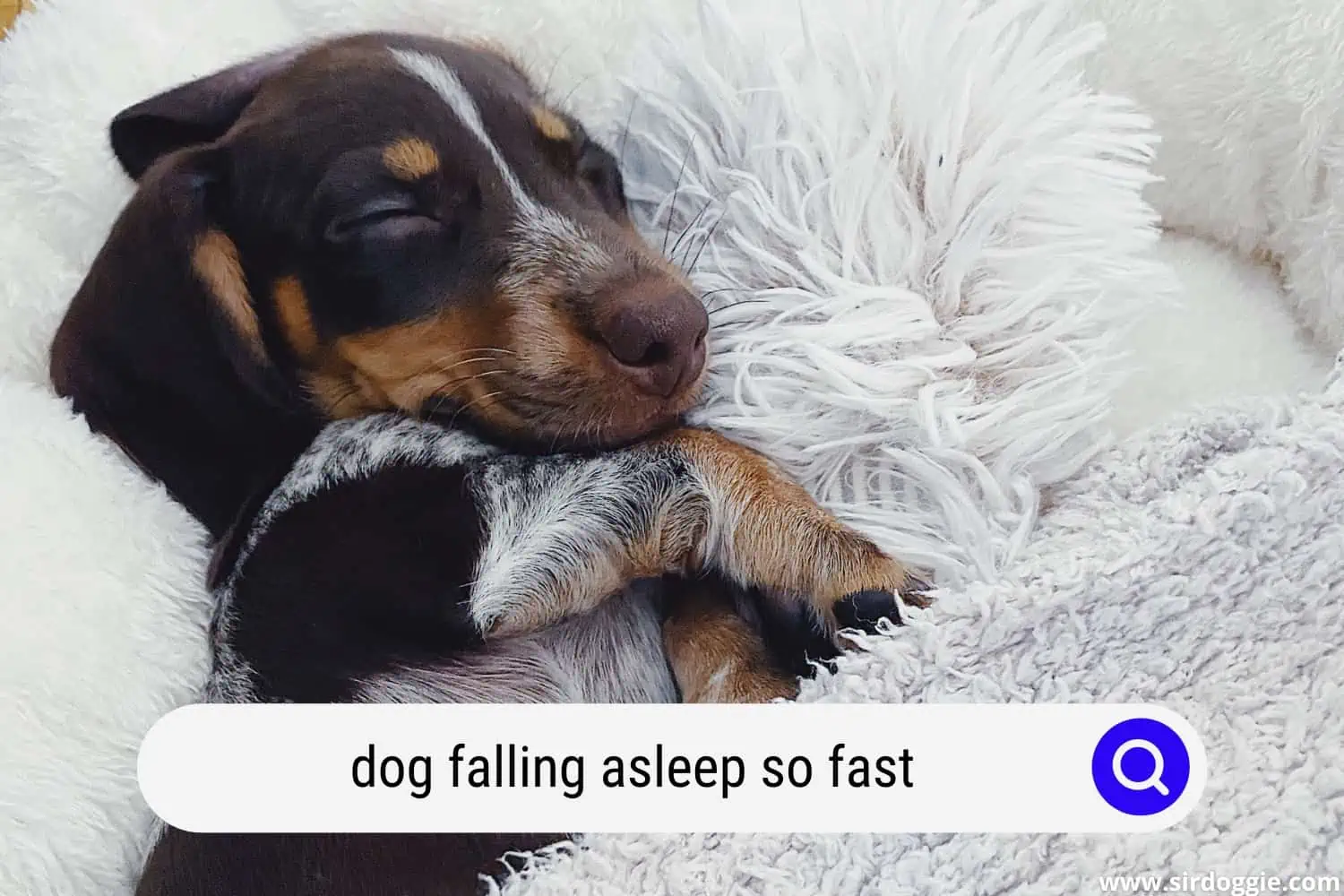How Can Dogs Fall Asleep So Fast?
Many new dog parents are surprised by how much time their pet spends sleeping. They may even be concerned that their napping dog is ill due to all of the extended sleep, but it is quite normal for dogs to sleep about 12 hours a day and sometimes more. However, pet parents remain intrigued (or even a bit jealous!) and are usually curious about how it is that dogs fall asleep so rapidly.
So, how can dogs fall asleep so fast?

Dogs fall asleep so fast because it is simply an ability in their genetics. Before domestication, the wild dogs of the past needed to preserve a lot of energy to meet the demands of their tough and laborious daily lives; thus, they developed to be able to sleep quickly and wherever they felt most comfortable. Although our domesticated pups are now spoiled rotten and don’t have nearly as many demands placed on them, they still have this ability to sleep whenever and wherever they please.
Furthermore, dog sleep is usually referred to as being “light yet lengthy.” This is because they don’t have an extended REM part of their sleep cycle like us nor do they have a sleep cycle that’s as long as we humans have, so these quick sleep cycles also help lead them to sleep faster since the entire process is drastically shortened and much lighter. A dog’s breed is also important here because some breeds, such as Saint Bernards and Bernese Mountain Dogs, will need much more rest and, therefore, sleep a few hours longer by comparison to other dogs.
Dogs are extremely adaptable sleepers with a remarkable tendency to fall asleep practically anywhere. They also can wake up and become awake promptly, regardless of how much sleep they have received. Fortunately for them, our fur babies do not require the regular intake of coffee or tea that we humans rely on to wake up properly thanks to this unique trait.
What is the average amount of time it takes for a dog to fall asleep?
On average, it takes just around 8-10 minutes for a pup to go into their light kind of sleep. Their ability to swiftly relax into their bed, shut their eyes, and fall asleep is exceptional. However, take note if they look restless or if the falling asleep process appears to be taking longer than expected. Your dog should generally not be having any sleep problems.
Related Reading: Can Dogs Sleep With Their Eyes Open?
Do dogs fall asleep instantaneously?
While it isn’t instantaneous, it is still pretty quick. This is partly due to the desire as well as the biological need for rest that swiftly takes control and causes dogs to enter a state of deep sleep quickly.
It is easy to be a little envious of our furry friends for possessing this skill (i.e., falling asleep quickly) while we are tossing and turning in our sleep, too.
Can dogs suffer from a lack of sleep?
Yes. Dogs can develop some problems due to lack of sleep. Just as with humans, sleep is essential for dogs because it allows their bodies to repair. A sleep-deprived dog will have a compromised immune system, making them more susceptible to illness and putting them in danger of developing catastrophic conditions. Lack of sleep has a substantial impact on a dog’s emotional state as well. They will suffer from exhaustion and an increased risk of obesity due to a lack of sleep, and this is a massive problem for our canine companions.
Lack of sleep is also termed “insomnia.” It is a rare condition when it comes to dogs, unlike people. However, it does still occur.
Additionally, some senior dogs experience difficulty falling asleep and remaining asleep. When it comes to elderly animals, it’s not uncommon for owners to bring their dogs to the veterinarian with one of the following issues:
- Physical issues often create canine sleep issues. By the time they reach the age of seven, the vast majority of dogs suffer from dental problems. In the absence of regular dental brushing by their owners, dogs can develop severe gum disease and tooth decay that can be quite painful and may deprive them of sleep.
- A dog may roam around a bedroom or perhaps the entire home when restless and unable to fall asleep. They may also have periods of panting as if they are sweaty or worried, even when the air conditioning is turned on and there is nothing visible to be concerned about. The 58-62% of American people who sleep with their canine companions report that their dog continuously has to “fluff up” their bed or adjust themselves in it, and this is the most aggravating aspect of their relationship with them.
- Numerous elderly dogs suffer from arthritis, and bladder and digestive difficulties, and have also slowed down to the point that they feel chilly at night due to their reduced metabolism. Anxiety can also be exacerbated by impaired night vision and a diminished sense of smell. In addition, some elderly dogs acquire canine cognitive impairment, which is the canine equivalent of Alzheimer’s disease and is characterized by sleep disruptions, among other behavioral concerns.
The use of a nice, warm bed and encouraging physical contact with their human family before night can assist most dogs in managing their insomnia. A veterinarian may also recommend drugs for pain relief as well as therapy for canine cognitive dysfunction if either of those concerns are applicable, so be sure to visit your vet regularly in those situations.
What environment do dogs like to sleep in?
Dogs like to sleep in a comfortable environment. To create a relaxing and comfortable environment for canines, you must take care of many things, such as:
- You must provide them with something soft (bed, etc.) on the floor.
- Try to make their sleeping area beside you or as close as possible to you because dogs love their pet parents and want to be around them while sleeping.
- Always provide an indoor area for your dogs to sleep.
- Take care of their sleeping times/patterns. Most dogs sleep between 9 pm and 6 am, but your dog may have its habits when it comes to his or her preferred sleeping times throughout the day.
- Adjust the room temperature. It should be close to ‘room temperature’ as much as possible.
- Dogs also prefer fresh air. If possible, open the window.
- Keep the lighting as dim as possible. Dogs love to sleep in low light.
- Ensure that there are no harmful elements present in the environment (e.g., the fear of any predator, fall risk from an elevated bed, etc.).
- Try to reduce noise (such as television or music) as much as possible. Dogs’ hearing is much more sensitive than ours, and these noises are already problematic enough for most people.
If you provide all the things mentioned above, your dog should be more than happy, love the comfortable environment, and be able to sleep well.
The Importance of Speaking to a Veterinarian
Speaking with your veterinarian about your dog’s sleeping habits is a good idea. It goes without saying that if your dog appears to be having difficulty falling asleep or waking up very quickly, you should keep an eye on them and consult your dog’s vet if it becomes a regular problem.
Having trouble falling asleep or remaining awake while also displaying indications of pain may indicate that your pup is suffering from an undiagnosed medical condition or possibly even anxiety. Some pet parents have difficulty getting their puppies to sleep independently for a short period, but this isn’t very unusual. A dog that has difficulty getting to its feet though may be suffering from an underlying disease that is causing them discomfort or fatigue and may lead them to becoming depressed. If you have any concerns, you should consult yours.

FAQs
Should your dog be allowed to sleep in your room?
It is acceptable to allow a dog to sleep in their parents’ bedroom, and some even prefer it. It all boils down to personal taste when deciding if this sleep arrangement is best for your situation or not. If you’d like your dog to sleep in your room with you at night, that’s just fine.
Should dogs be allowed to sleep outside?
Dogs should always be allowed to sleep indoors with their owners. Even though certain dog breeds perform well in hot weather and others do well in cold weather, no dog breed is meant to survive excessive heat or cold for extended periods.
When dogs are exposed to the weather and extreme temperatures for extended periods, they become highly vulnerable. This is especially true for senior dogs, ill dogs, and brachycephalic dogs. In addition to climate threats, dogs left outside overnight face various other dangers, such as nocturnal animals, insects, poisonous plants, and chemicals used in yard upkeep. The safest place for your pup, when the world is asleep, is indoors with the rest of the family.
Do dogs enjoy having blankets wrapped around them while sleeping?
Dogs are well-known for their affection for their blankets during sleep. It provides them with a cozy area to cuddle up and relax, whether they are at home or on the road. It doesn’t matter what kind of lifestyle you have; this is a simple investment that any dog lover can make to raise the standard of living for their companion.
Do dogs enjoy being cuddled before going to sleep?
Dogs have a natural affinity for cuddling in their owners’ beds. Although dogs appreciate the company of their owners, they also tend to bring in a variety of bugs and viruses that you don’t want getting into your comfy bed linens. If your dog spends a lot of time outdoors, you run the risk of certain invisible parasites being brought into your bed when allowing them to share it with you. It’s best to snuggle your pup on the floor and next to the bed rather than risk contamination and health issues that may not be immediately apparent.
Also, as a side note, there are several sorts of hugs that dogs do not like, such as bear-style cuddles or other variations that smother them and make them feel overly restricted. Let your dog guide you into learning the types of cuddles it prefers to receive from you.
What factors influence a dog’s decision on who to sleep with?
Canines are naturally packed creatures, and they like sleeping in the company of their companions. The more closely they sleep together in the natural environment, the better since cuddling together provides warmth and security. If your dog perceives you to be the pack’s leader, he will most likely prefer to sleep near you.
Is it necessary for dogs to sleep in silence?
As discussed above, dogs require a peaceful and quiet environment to sleep better. Being boisterous and crazy at night right before bedtime will just serve to stimulate the dog further, making it much more challenging to get him to sleep in the future.
Related Reading: Why Does My Dog Check On Me When I’m Sleeping?

Family Dog Expert Author
Hi there! I’m Stuart, a devoted dog lover and family dog expert with over a decade of experience working with our furry companions. My passion for dogs drives me to share my knowledge and expertise, helping families build strong, loving bonds with their four-legged friends. When I’m not writing for SirDoggie, you’ll find me hiking, playing with my beautiful dog, or studying music.